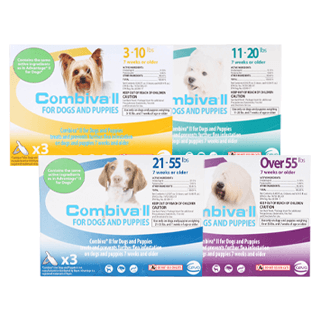
Why Are Fleas Worse In The Fall?
Posted September 9, 2019 in General

Combiva II for Dogs & Puppies
Compare to Advantage II. Kills adult fleas and prevents further re-infestation on dogs. Kills re-infestation fleas within 2 hours. Breaks the flea life cycle and prevents flea eggs and larvae from developing into adult fleas
Advantage Household Fogger
Kills fleas in all phases of development and maintains up to seven months of flea and tick control.
Summer may be winding down, but that doesn’t mean the fleas are packing up and heading into hibernation. As a matter of fact, autumn tends to be one of the worst times of the year for flea infestations, because these pesky little bloodsuckers actually thrive in cooler weather, becoming an even bigger problem than they were in spring and summer. Autumn flea prevention is essential to protect your home, your family, and your pets.
Why are fleas most active during the fall? Shouldn’t they be dying?
As mentioned before, fleas thrive in cooler weather. They’re particularly active in temperatures of 70-75° Fahrenheit (which is about average for most states during the fall). In conditions such as these, they can complete their natural life cycle (from egg to larva to adult) in a matter of weeks; and a female flea typicallys lay 30-50 eggs a day! Put two and two together, and you have millions and millions of these obnoxious little pests!
Where do fleas hide during the fall?
Fleas dislike sunlight, so they often congregate in tall (i.e. un-mowed) grass or take refuge underneath piles of leaves. These environments shield them from the light while, at the same time, providing an opportune location to lie in wait for a host.
Infographic: The Lifecycle of Fleas >>
Once they’ve jumped onto an unwary dog (or person), a flea typically remains attached to its host. So let’s say your dog picks up a parasite while frolicking in that pile of leaves in the corner of the yard. When they come indoors, they’ll bring the infestation with them, and the fleas will continue to reproduce inside your home! Sometimes, flea larvae burrow into the carpet (where they also have protection from light) until they mature. As adults, they can remain hidden amid the carpet fibers and then jump on hosts as they pass by.
One more thing to keep in mind: as you know, autumn is the time of year that our furry friends start growing winter coats. This is their bodies’ natural way of preparing for the even more frigid months ahead. Unfortunately, longer fur also means that parasites living on your pet’s skin now have thicker, fuller protection and denser hiding places. When you get down to it, an autumn flea infestation is a predicament to avoid at all costs.
Related Article: My Dog Has Tapeworms! >>
How can I prevent an autumn flea infestation?
So the best way to avoid an infestation is to prevent it before it even happens. Here are some preventative measures you can take.
- Frequently mow the lawn. If the grass surrounding your house doesn’t become too tall, fleas will have fewer places to hide and will be less likely to converge near your house.
- Check out our selection of yard sprays. Make your lawn inhospitable to fleas with products such as Adams Plus Yard Spray, which is designed specifically to kill pesky insects in lawns, flowers, trees, and shrubs.
- Vacuum regularly. Since fleas frequently hide in the carpet to avoid light, try vacuuming all floors in your house at least once a week. This will help get rid of any pests who might’ve snuck in!
- Regularly wash your pet’s bedding in hot water. The heat and water of a thorough wash cycle will help kill any pests who’ve taken refuge in your pet’s bedding.
- Keep your pet on their flea + tick meds. This is the most effective solution of all. Just like with heartworm meds, your pets need flea and tick protection all year long. Just remembering to give them their meds every month greatly reduces the odds of an infestation.



